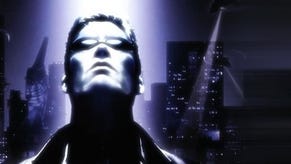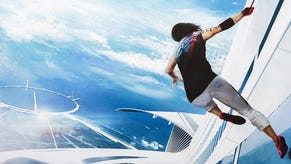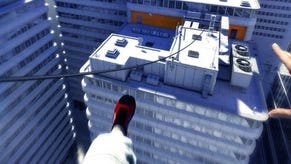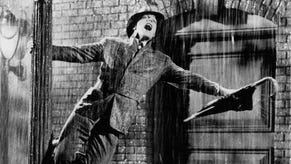Mirror's Edge
Doing a runner.
Equally, multiple routes and opportunities seem to suggest themselves everywhere, and even though the level is a simple trek from start point to finish line, there's a real variety in how you get there, whether you choose to wall-run, pick your way around fences, or hurl yourself from rooftop to rooftop. Throughout this, the bob and weave of the camera is invigorating without being distracting, and the final leap from the last building triggers Reaction Time, built up through successful movement combos, which allows you to slow proceedings at crucial moments where you have to pull off something particularly tricky in mid-air.
If the trailer level suggests that this is one long, uninterrupted sprint of a game, the new environment we're shown next changes the tone entirely. Moving from the top of the world to the bottom, we're now deep down in a storm drain - a massive pit of gleaming concrete - looking up. The job here is to work from railing to walkway, picking a way to the top. There are gentle puzzles - move a crane-load of pipes to act as a bridge - but nothing that would stump Dr Rubik for very long. Much more exciting is the effortless way Mirror's Edge slots itself into a new rhythm, a cautious and precise stop-start pacing that's a lifetime away from the smooth free-running on the rooftops above. It's a shame to see a little bit of cloning going on (one pile of boxes turns up several times, which can be particularly distracting when you're trying to get your bearings in such a sterile environment) but the game has lost none of its self-assurance in the change in gear.
Getting to the top of the drain, there's a final surprise - violence. A quick kick allows Faith to snatch a rifle from an enemy, and then it's into FPS territory as you've come to expect it. Sort of. Gun in hand, the balance with which Mirror's Edge manages its separate mechanics is on display: fire-fights are a welcome change after all that climbing, and the business of finding cover and trading bullets is handled with noisy flair, but the game never lets you forget what it's really about. Pick up a weapon, and your movement is instantly limited: guns are an encumbrance you'll need in certain situations, but you'll be happy to ditch them again once the fight is finished, so that you can regain your intoxicating litheness once more.
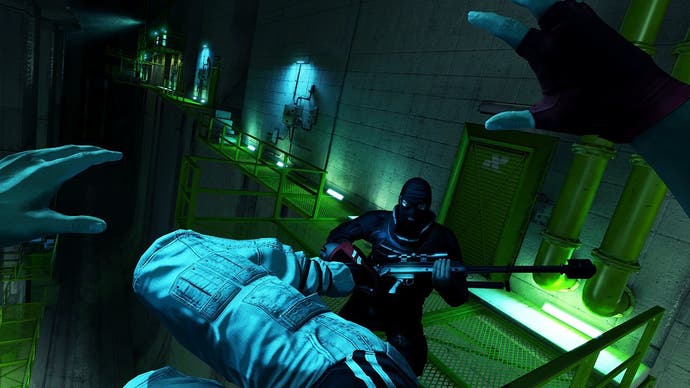
To see Mirror's Edge running is to instantly want to play it, but that's not to say there isn't anything to worry about beyond the fact that EA are being sparing in handing over the controller. Even if the game succeeds in nailing first-person movement, there are still huge problems to overcome in terms of hand-to-hand combat - something we've seen very little of so far. It's also a little disappointing to learn more of the back-story (even if it is presented in fantastic flat-colour anime) and discover that the justification for all this acrobatic rebellion is a kidnapped sibling; Double Dragon-style justifications don't seem appropriate turning up at the centre of a game that otherwise seems to transcend cobwebbed tradition.
Parkour, bullet-time, and the kind of premise that, while refreshing for games, could still fit rather snugly into one of those more introspective episodes of Star Trek: such is the grace and self-assurance of Mirror's Edge's presentation, that it comes as a slight shock to eventually realise not many of its components are actually that new. But at the centre of the game, the ambition for the broadening of first-person play is a charmingly risky agenda, and the potential rewards could reinvigorate at least two aging genres.
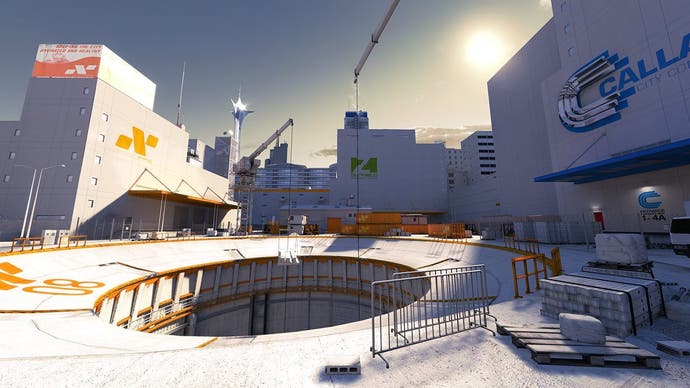
It's the risks which make it easy to understand why EA seems a little nervous about Mirror's Edge: failures like Breakdown have proved that people tend to expect a healthy does of "S" along with their "FP", and the strengths of this title - its style and quirky approach - mark it out from the crowd in a way that is probably already making focus testers feel sick in the mornings.
But DICE at least seems confident in what it's doing: little details show their enthusiasm, such as the placeholder text in the hint screens that reads, "If you can dream it, you can do it", and suggests a team that has a serious devotion to the task at hand. Mirror's Edge may have a lot to prove, but there are a couple of things that it's already got right: it understands that if you're going to spend most of your time in action games moving, then moving should be an interesting activity in itself, and it also tries to take its players somewhere different. Until we've played it for ourselves, we can't yet tell what that's going to be like when we finally get there, but it should be fascinating finding out.
Mirror's Edge is due out on PC, PS3 and 360 later this year.


